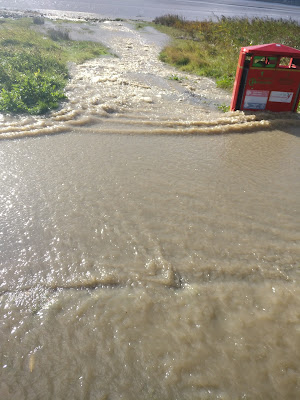This blog may help people explore some of the 'hidden' issues involved in certain media treatments of environmental and scientific issues. Using personal digital images, it's also intended to emphasise seasonal (and other) changes in natural history of the Swansea (South Wales) area. The material should help participants in field-based modules and people generally interested in the natural world. The views are wholly those of the author.
Sunday, 20 February 2022
Flash Splash!
On several days, in July 2021, more than one month's rainfall fell in a single hour in parts of London. This volume of rain produced flash flooding, creating perilous conditions in the Underground transport system, hospitals, homes etc. Major flash flood events will obviously become more common as climate change intensifies. A London Council taskforce report concludes there is a significant risk of people drowning in London in such events (https://www.theguardian.com/uk-news/2022/feb/20/london-flooding-poses-significant-risk-unless-immediate-action-taken). London's Victorian sewage system was never designed to deal with dramatic volumes of rainwater. The taskforce report notes, with concern, the lack of an overall plan or authority to tackle the increased flood threat to the city. The report says that immediate action is needed, to rule out the possibility of substantial loss of life in basement flats and other low lying places. Other major UK cities also need plans for dealing with major flash floods.
Subscribe to:
Post Comments (Atom)
-
I n the UK and US, a pparently popular and successful vegan/vegetarian restaurants are reportedly closing or adding meat to their menus ( ...
-
Early ripening fruit may seem convenient but some folk think it confirms environmental stress. There's also a possibility th...


%20mating%20NWCW.jpg)


No comments:
Post a Comment